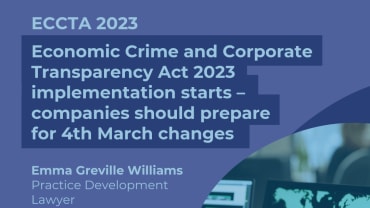There are a variety of reasons why a company may seek to purchase its own shares. It is an alternative means for returning surplus cash to the shareholders and, in the context of private companies, it provides an exit route for shareholders who wish to leave the company. Companies must, however, be mindful of the strict statutory procedure to be followed when effecting a buyback. This blog provides a high-level overview of the procedure and considers the implications of non-compliance.
There are several means through which a company can finance a buyback. This blog is limited to the most common kind, that is, buybacks funded through a private company’s distributable profits. Additional rules apply to buybacks financed from the proceeds of a fresh issue of shares or by a public company, while a separate procedure must be followed for buybacks financed out of capital.
In this blog, references to legislation are to sections of the Companies Act 2006 (“the Act”).
The importance of procedure
It is critical that limited companies seeking to effect a buyback comply with Part 18 of the Act. A failure to do so can ultimately render the purchase void. This, in turn, may lead to a difficult situation where the exiting shareholder still holds legal title to the shares, despite the company having paid the purchase price. In addition, the company, and every officer in default, will have committed a statutory offence. Officers in default are liable to a prison term of up to 2 years, an unlimited fine, or both (s.658).
Pre-buyback considerations
Prior to the buyback, the company’s articles of association (and any applicable shareholders’ agreements) should be reviewed for prohibitions or restrictions on the purchase of the company's own shares (or any specific consent rights). This includes pre-emption provisions, which require the shares to be offered to the existing shareholders before being transferred to another party (in this case, the company). Any prohibitions or restrictions on transfer should be waived or amended prior to the buyback taking place.
The shares which are to be purchased must be fully paid (s.691(1)). Where the shares are only paid in part, the company should call up the balance or, alternatively, reduce the nominal value of each by the amount unpaid via a reduction of capital.
Shareholder approval, timings & payment
A buyback can only take effect if there is an express agreement between the company and the selling shareholder which is approved before the purchase (s.694(1)).
Unless the articles provide otherwise, the agreement can be approved by an ordinary resolution (s.281(3)). In other words, a simple majority of shareholders. The ordinary resolution can be proposed at a general meeting of the shareholders or, as is more common, by written resolution. Where the written resolution procedure is followed, a copy of the agreement must be circulated to each eligible member (and to the company’s auditor if it has one) either at the same time, or prior to, the written resolution (s.696(2)(a)). The "eligible members" will not include the shareholder whose shares are being purchased (s.695(2)) (so they are not able to vote on the resolution).
In terms of timings, it is a requirement of the Act that the shares are paid for at the time of purchase (s.691(2)) (other than shares bought back for the purposes of, or pursuant to, an employee share scheme). This, therefore, precludes the possibility of deferred payment or payment through instalments. If insufficient funds are available to pay for the shares at once, it is possible for the shares to be purchased in tranches. The price for each tranche must, however, be paid in full at the time the relevant shares are transferred back to the company.
Post-buyback requirements
Provided the consideration exceeds £1,000, stamp duty will be payable on the purchase price at the current rate of 0.5%. In addition to stamp duty, there are a number of other post-buyback requirements for the company to comply with. This includes the following Companies House filings:
(i) Form SH03: The payment to HMRC should be accompanied by a return of purchase of own shares (Form SH03). Following confirmation by HMRC that the correct amount of stamp duty has been paid, the Form SH03 should be filed at Companies House. The Companies House filing must take place within 28 days of the shares being delivered to the company (s.707).
(ii) Form SH06: Shares which have been bought back using distributable profits can either be cancelled or held in treasury (s.724). Where the shares are cancelled, a notice of cancellation (Form SH06) must also be filed at Companies House within 28 days (s.708).
(iii) Special resolutions: Any special resolutions passed in connection with the buyback (i.e. to approve the buyback agreement (if required) or adopt new articles) must be filed at Companies House within 15 days of being passed (s.29 and 30). Where the company has adopted new articles, a copy should be filed along with the special resolution (s.26(1)).
In terms of final steps, the company's register of members must be updated to reflect the buyback (along with the register of transfers and PSC register, if required), and a copy of the agreement must be kept available for inspection at the registered office. The relevant period for inspection is 10 years beginning from the date of completion (s.702).
How can Brodies help?
It is critical for share buybacks to follow each stage of the prescribed procedure, and this is an area where having specialist advisers on board can help. Our Corporate team regularly advise on all aspects of share buybacks, using any of the possible funding methods. If you are considering effecting a buyback, or have any related questions, please get in touch with your regular Brodies contact or one of the contacts listed below.














